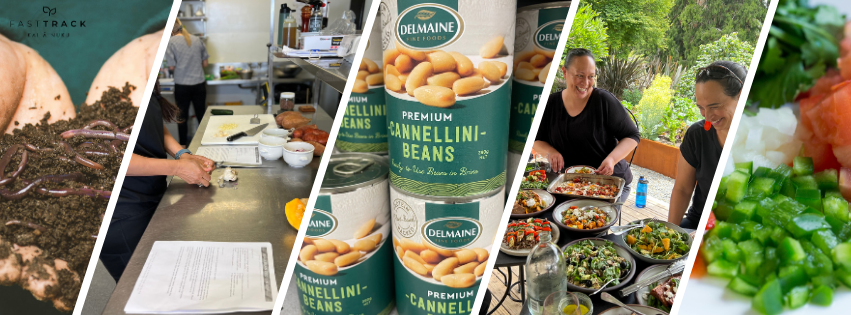Our Top 10: Food Saving Tips n Tricks
Lets be honest - No one likes to waste food!
At Fasttrack we give you the tools so you can get the most out of every ingredient, whether it’s simply by extending shelf life or reusing leftover meals in a completely new way.
Reducing food waste is important for ensuring environmental sustainability, all while being kind to your wallet. By adopting simple but effective strategies you can significantly minimise the amount of food you throw away. Understanding expiration dates, using leftovers creatively or freezing for a later date are practical tools that help extend the life of kai!
If you fancy composting and gardening and it is something you are able to accommodate, composting your food scraps can be an epic way to reduce your food waste and turn into an awesome little sustainable life cycle in your own back garden.
- Do this by adding items like vegetable peels and coffee grounds to your garden to create a nutrient rich soil!
Below are some of our favourite tips and tricks that you can incorporate into your everyday life:
- Plan your meals aka reduce decision fatigue!!!
One day a week sit down and create a meal plan for the a few days or the whole week (FTKĀN does that for you) to avoid buying more than you need and make a shopping list based on your plan and stick to it - don’t forget to check what you have in the pantry first!
2. Meal prep.
Prepping ingredients for the week can be a huge help for time management and reducing food waste. If meals or ingredients are all ready to go they are much less likely to go to waste.Do this by…
- Slicing and dicing veges
- Pre-cook any grains
- Make your dressings ahead of time and store in jars in the fridge!
3. Know the expiration dates
“Best before” and “use by” dates can be confusing. Best before lets you know how long foods will last before they lose their quality and use by date must be consumed before or on the date listed.
4. Utilise proper storage
Storing fruits and vegetables in different waysto extend their shelf life. For example, store celery and carrots submerged in water in the fridge, onions and potatoes in a cool, dry place and fresh herbs in a jar of water (just like a flower bouquet).
5. Practice FIFO aka First In, First Out
Use older items before newer ones. When you buy groceries, place new items behind the older ones in your pantry or fridge.
6. Use leftovers creatively
Turn leftovers into new meals. For example, combine left over veges with some eggs and make egg cups for an easy to grab snack.
7. Freeze extras
Freeze your leftovers. Not everyone likes to eat the same food day after day, by freezing leftovers you can simply have a meal prepared weeks in advance. You’ll be thanking yourself later!
8.Buy in bulk
Buying in bulk can save money, but make sure you can use it all before it spoils. Consider sharing bulk items with friends or whānau.
9. Make substitutions
If you don’t have the exact ingredient for a recipe don’t stress and just try to make a substitution instead! For example: no cannellini beans just use that old tin of kidney beans instead! Don’t have spinach, but your garden has an excess supply of silverbeet, silverbeet it is!
10. Share & connect
Learn more about food waste and share tips with family and friends to help create a culture of reducing waste.



 Total:
Total: